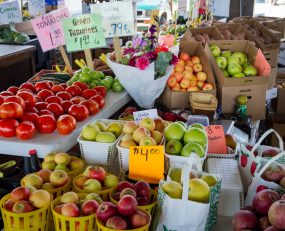
Though the virus has been slow to take hold on the African continent the preventative measures came early, unfortunately affecting Kenyan exports. Many African countries have acted fast in implementing the precautions, such as closing borders or enforcing lockdowns, because the impact of the virus spreading around the continent could be catastrophic.
Restrictions in Kenya have caused knock-on effects for all logistics services. Bolloré and DSV Panalpina are a few of the forwarders to note how the curfews and closures of borders have slowed trade across the whole country, with significant impacts on road transportation. Similar impacts have been experienced with numerous flight cancellations, and delays at the Port of Mombasa, which has been causing problems for the transportation of perishable freight.
As of April 2, according to the BBC ‘Coronavirus in Africa tracker’, there were under 7,000 confirmed cases in the whole of the African continent. To put this in perspective that is around five times less than the UK alone. Kenya itself has below 100 recorded cases but expects this to rise sharply to 10,000 by the end of April. The government has made bold moves to contain the virus with social distancing policies, curfews, border closures and a ban on some imports including second-hand clothing. However, these very precautions are testing the food, agriculture and perishable industry in Kenya.
Kenya is the largest exporter of fresh flowers to Europe, but in light of the Coronavirus pandemic, flower exports to the European Union (EU) have dropped by over 50%. The grounding of many flights has caused cargo capacity to dwindle, which is essential to the export of perishables. Whilst trade continues on a reduced scale, both ends of the supply chain have been hit. In Kenya, the government enforced mandatory leave for workers in this sector, leaving only a skeleton workforce, with most farms working at around 20% capacity. On the demand side, as most of Europe and North America remains in lockdown for the foreseeable, demand is disappearing for fresh cut flowers. As a result of both factors, farms are only exporting 20% of the daily 60 tonnes they normally send to Europe and disposing of the rest.
There is a real concern for the flower industry and the wider Kenyan economy as it is one of the top foreign-currency earners, worth $751m in 2019. Clement Tulezi, CEO of the Kenya Flower Council (KFC) has said, “We have been hit very hard, unlike other industries, say manufacturing that we can wait to see impacts in a week or a month. Ours is immediate.” The impacts of the virus are leaving people without employment, putting their homes and food security at risk.
The Kenyan fresh fruit and vegetable industry has also come up against similar problems. In recent weeks, there have been warnings that fresh produce will become scarce in Europe as the spread of the virus is impacting the supply and the movement of goods. This comes as the harvest in Europe is under threat as pickers tend to migrate to take up jobs but also the mandatory leave enforced in Kenya has meant over half the workforce was sent home. Kenya is a significant supplier of fruits, beans and peas to Europe, yet, the issue for this industry is not demand, but rather the industry struggling to ship those orders. Like flowers, produce is flown around the world, but the lack of available capacity is halting trade between countries. Some longer lasting fruits are shipped by sea, but truck drivers moving goods from Nairobi to Mombasa have noted journeys are taking up to 3 times longer, around 24 hours, due to roadblocks and restricted working times, causing produce to spoil sooner than normal rendering it unsaleable. Though demand is strong in Europe the quantity cannot be met, further adding to the approaching scarcity issue.
With the pandemic likely to spread and with already stringent restrictions imposed in Kenya these problems are likely to be exacerbated for Kenyan exports in the coming months. However, if the pattern of recovery is true, Europe and North America may see some lockdowns lifted in the next few months leading to a rebalance in supply and demand across the whole food, agriculture and perishable sector. It is only hoped that the situation in Kenya means demand can be met for its export market’s sake as well as its broader economy.
Source: Transport Intelligence, April 2, 2020
Author: Holly Stewart